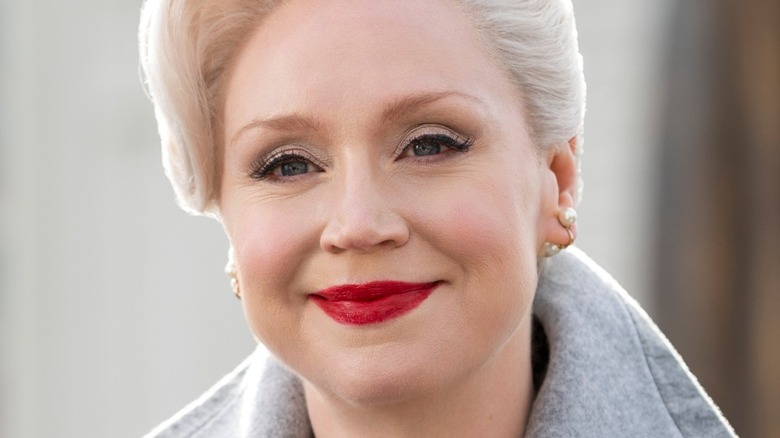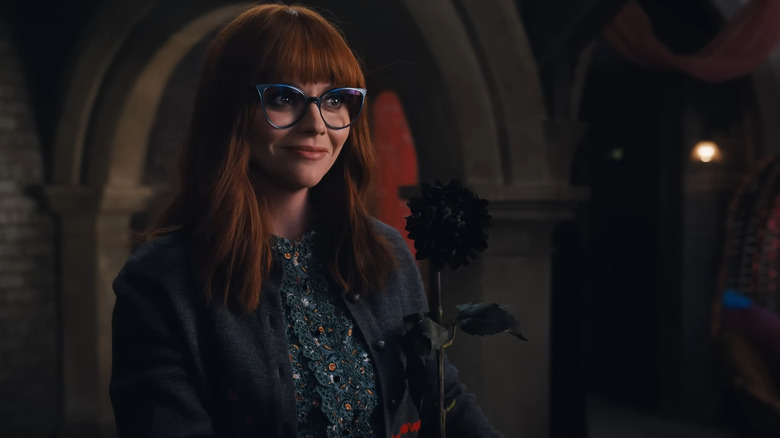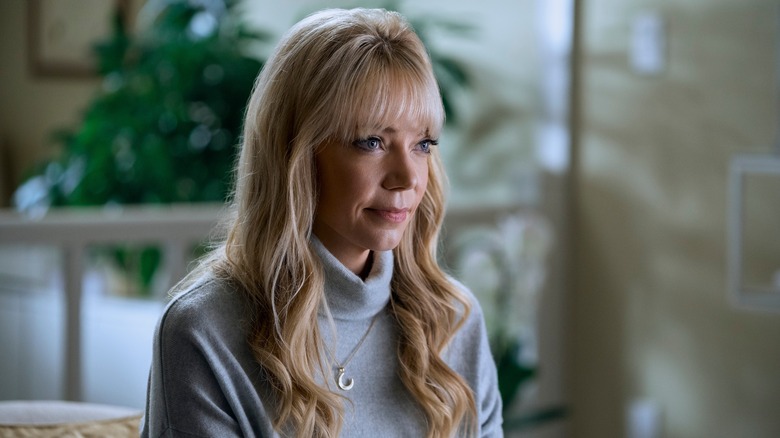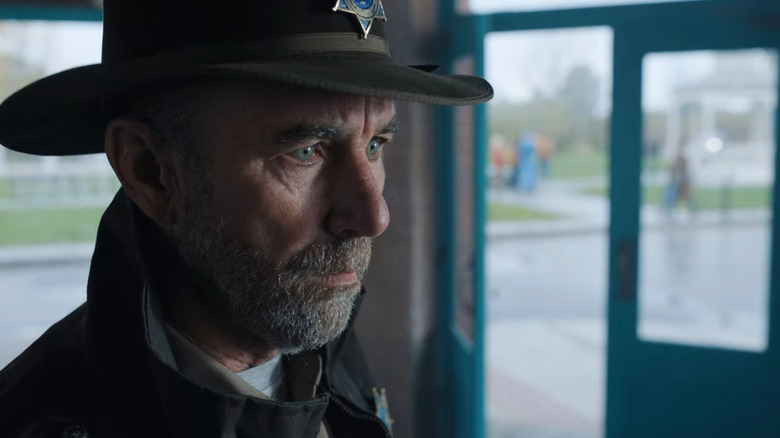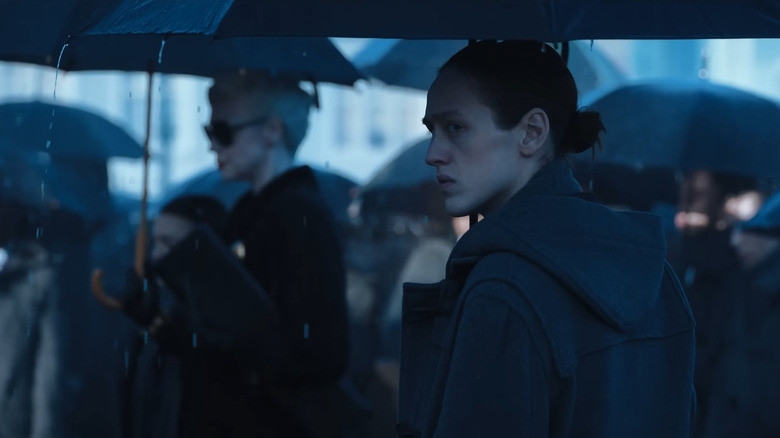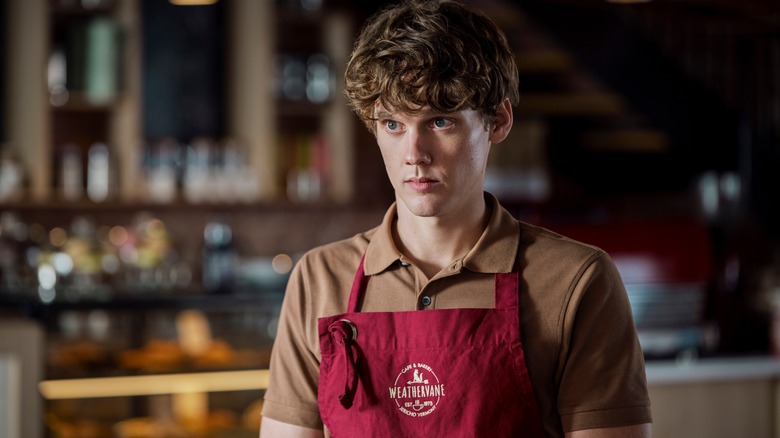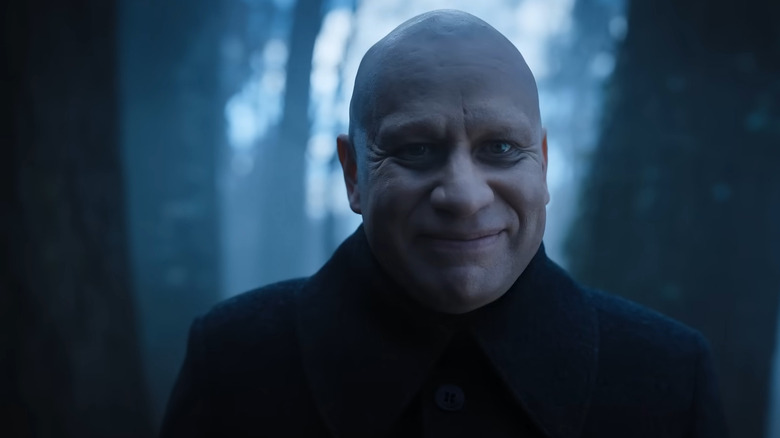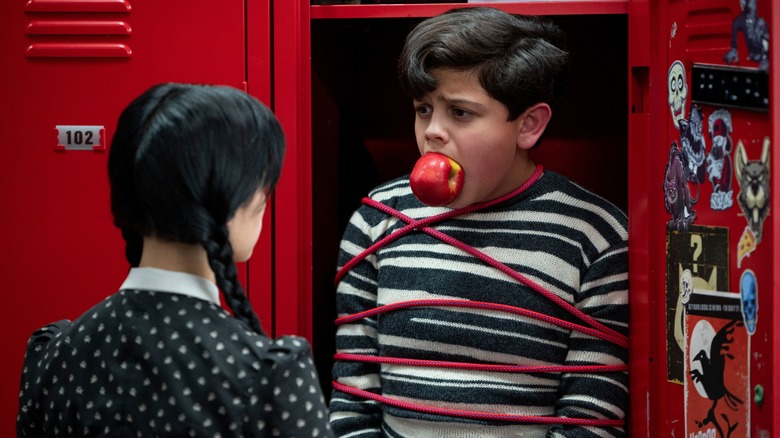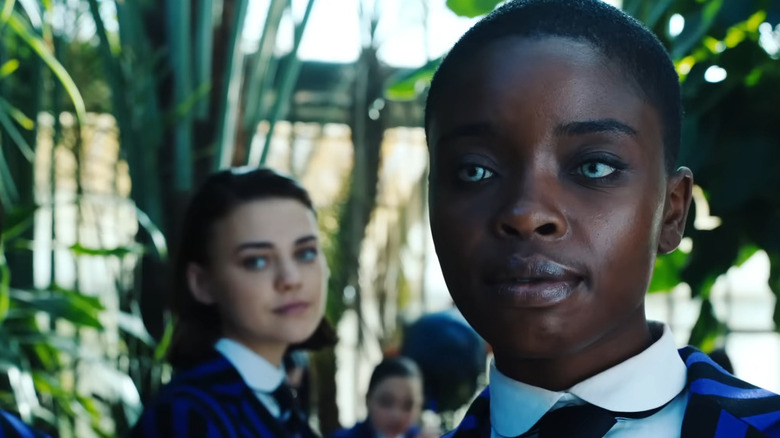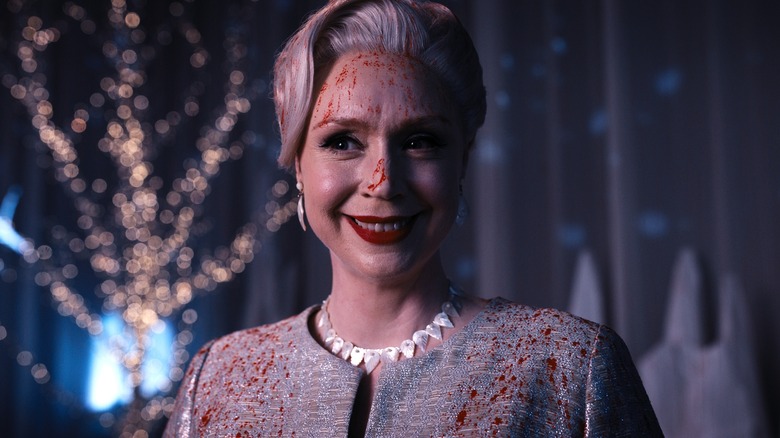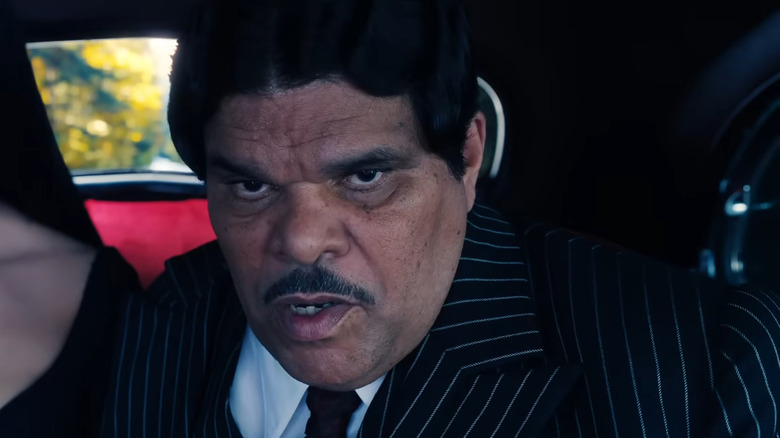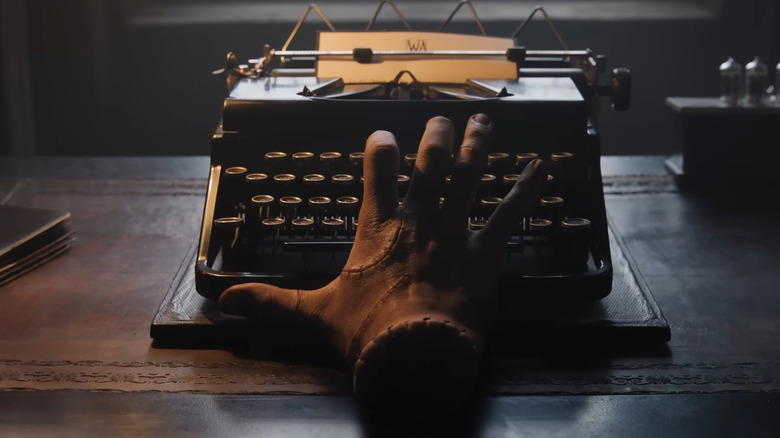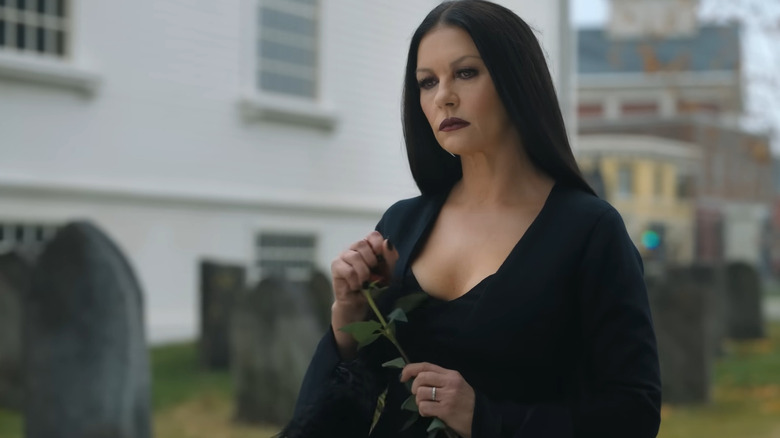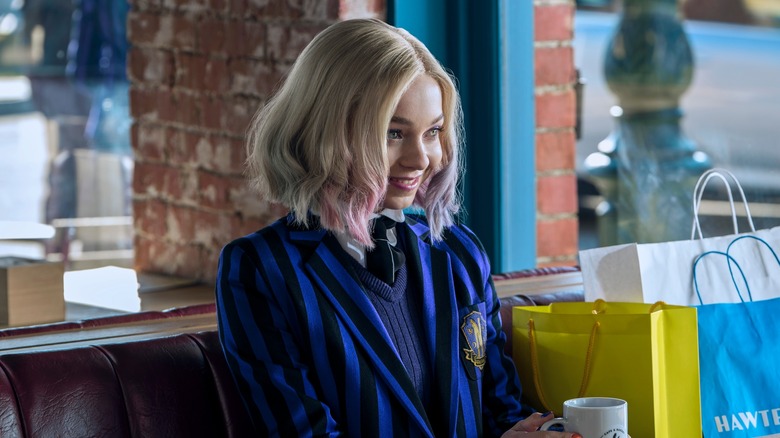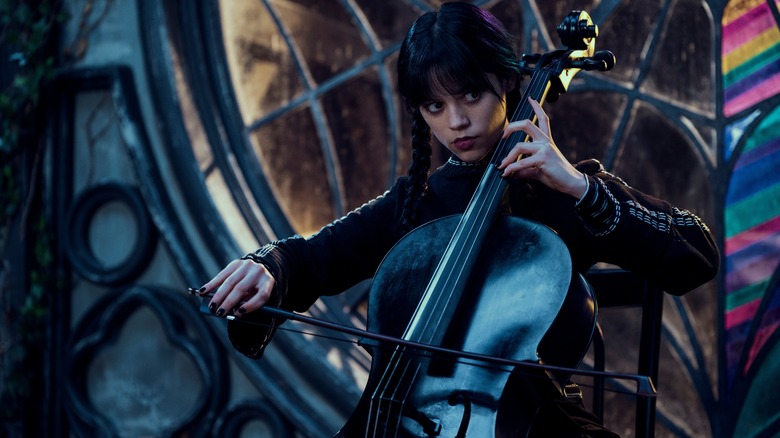Every Wednesday Character Ranked By Likability
Netflix's "Wednesday" brings a fresh, fun new twist to the kooky Addams family fans have adored for years. The series brings old and new characters to Nevermore Academy, where mayhem ensues in every episode and distinct personalities clash in various ways. As a story focusing mainly on the titular character, "Wednesday" allows viewers to get to know critical characters on deeper levels that make them even more pleasant. Or, perhaps, dreadful — Wednesday Addams would prefer it that way. What makes a character likable or unlikable so often depends on how much they show the audience, their part of the story, and how memorable they are.
As much as "Wednesday" blends new and old elements, it does a brilliant job of creating ensemble storylines that allow even guest characters to play key roles in the overarching story. Though some people we meet in the first episode don't make it to the very end, they still serve the plot, teaching the remaining characters what's necessary to break down what's occurring behind closed doors at Nevermore. Further, as a story with plenty of nooks and crannies, it's apparent by the season finale that this is only the beginning for these characters and the layers viewers will uncover within them. In a sense, the series has no unlikable characters because even the outright villains have compelling motives driving them. Still, there's good and bad everywhere, and "Wednesday" is no exception.
This article contains major spoilers for "Wednesday" Season 1.
14. Marilyn Thornhill
Wednesday Addams' status as an iconic character was bolstered considerably by Christina Ricci in a pair of 1990s films — 1991's "The Addams Family" and 1993's "Addams Family Values," respectively — but Marilyn Thornhill leaves a different mark. Ricci is thoroughly compelling as she makes the audience trust her, only to pull the rug right out from underneath us by revealing that she's the presumably deceased Laurel Gates and puppeteering every hyde attack at Nevermore. While Marilyn-slash-Laurel seems great at first because she chooses to get to know each of the students individually, the truth is, like her family, she's xenophobic against the outcasts.
And as the puppet master, Laurel's actions make her the most unlikable character solely because of her bigoted desires. In a place full of creatures, her disdain for inclusivity becomes an unforgivable mindset that's difficult to come back from. Laurel not only can't grow for the better, but even if she makes it out alive in the end, she doesn't want to change. The hatred runs deep inside her, governing her every move to manipulate and murder kids. As adorable as she seems in the beginning, there's no obvious redemptive path from her actions. Though she isn't the one doing the actual killing, she is entirely responsible for the deaths of multiple teens, Principal Weems, Dr. Kinbott, Mayor Walker, Rowan, and everyone who wrongfully found themselves in the woods.
13. Dr. Valerie Kinbott
Dr. Valerie Kinbott isn't unlikable, but unfortunately, she doesn't give the audience much to hold onto, either. By the time the series ends, viewers barely know who she is and what she stands for. While we could assume that her role as a therapist equates to a compassionate person wanting to help people, it's hard to believe it when, for the most part, she can't seem to connect with any of her patients. Even though she apparently establishes a bond with Xavier, we only hear of these sessions secondhand through Wednesday's dialogue.
She's critical to the story as someone the kids should be seeing as a means to help deescalate their battles within, but the series should've given her a chance to approach Wednesday in the same way that Thornhill does. Instead, in the final confrontation, we hear Kinbott dismiss Wednesday in a manner that's definitely not appropriate for a psychiatrist speaking with patients, even though Wednesday is entirely out of line with her accusations. Kinbott is dismissive at times, and though she doesn't deserve her untimely death, it's a bit hard to care for her.
12. Sheriff Donovan Galpin
Sheriff Galpin is neither likable nor unlikable, but he's a fascinating character once the audience learns more about him. Early in the series, it's evident that he's hostile to outcasts, consistently thinking the worst of all the kids at Nevermore — especially Wednesday when she and his son Tyler begin to get close. We eventually find out that he holds a massive grudge against Gomez Addams, believing that he's the one responsible for the death of Garett Gates. His grudge against Gomez and his disdain for outcasts undoubtedly influence his treatment of Wednesday.
Still, when his past opens up in the finale, Sheriff Galpin becomes a tragic hero of sorts. Galpin not only loses his wife — he also loses his son in more ways than one. And everything that we see shows us that he ultimately cares about protecting people — even the outcasts he claims to hate and fear at one point — making this final development much sadder. He has his crude moments, but once someone proves that they're innocent, he's big enough to own up to his prejudice, which is what happens when Gomez Addams' innocence comes to light.
11. Xavier Thorpe
Like Dr. Kinbott and Sheriff Galpin, Xavier Thorpe falls between likable and unlikable. It's not really his fault that he appears to be somewhat creepy at times — otherwise, he wouldn't work as well as a red herring murder suspect. Simultaneously, there's still much about him we need to know to determine his personality. From what we can see, however, Xavier values transparency and agency. We initially learn this when he asks Bianca if she used her powers on him, indicating that their relationship might've been a lie. Because of this, he leans more towards likable than unlikable because viewers understand that he operates on honesty.
Xavier shows up in the series as both a loner and a popular kid, which is unique for the teen drama genre that generally focuses on one or the other. But when we learn that he values privacy and insists that people treat him as he treats them, his character begins to play a more critical role. When he's free, viewers see that — like Sheriff Galpin — Xavier is capable of atoning for his wrongs. In the end of "Wednesday," he's the first person to gift Wednesday a cellphone and potentially become another trustworthy friend.
10. Tyler Galpin
Tyler Galpin should be a likable character. He's sweet, gentle, patient, and empathetic. He's also a character who's undoubtedly been through hell and back after the loss of his mother and upbring via his father's questionable parenting skills. But Tyler, as a hyde monster and Laurel's puppet, is detestable. However, "Wednesday" presents the audience with a multifaceted, well-written character through his arc. As it turns out, pretty much everything he becomes is entirely against his will. Laurel uses his grief to manipulate him into finding solace with her, and then she uses torture tactics to turn him entirely ruthless.
But while Tyler might not have much agency in the beginning, what he tells Wednesday at the police station proves that he's too far gone. He not only remembers every murder, but says he enjoyed committing them. Still, unlike Laurel, because Tyler has his father caring for him and their family's trauma to unpack, the series could set up a redemption arc for Tyler at some point. After all, his trauma stems from grief and heartache — he's not fundamentally motivated by xenophobia like Laurel. At the end of the day, while Season 1's Tyler might not be likable, he's undoubtedly one of the most compelling characters in the series.
9. Uncle Fester
Christopher Lloyd's version of Uncle Fester might be just as influential as Christina Ricci's Wednesday, but Fred Armisen more than does the character justice on "Wednesday." The onetime "Portlandia" star brings the bonkers and spooky "Addams" staple to life with his approach to the character's adoration for his niece and nephew. Though viewers only get to see him in the series' seventh episode, he seamlessly reminds the audience why he's a favorite relative from the moment he appears on the screen.
The thing about Uncle Fester is that we never know quite what he's up to, but that's part of his appeal. Despite his ambiguity, he often makes the audience trust him regardless. He's a family man through and through, which effortlessly seeps onto the screen as he drops by Nevermore to check on Wednesday. He's also the one to revive Thing with his electrical powers after Wednesday finds him unconscious from a stab wound. Should the series return for a second season, Uncle Fester should be in it far more so the audience can witness additional hijinks.
8. Pugsley Addams
Because the series takes place primarily at Nevermore Academy, viewers don't get to see members of the Addams family as much. As a result, we don't get to know much about Pugsley Addams, which is a criticism we could apply to a few other versions of "The Addams Family" we've seen over the years. Writers can never figure out what to do with Pugsley, it seems. However, in the short amount of time we spend with him on "Wednesday," it's astonishing that he's an Addams considering how much warmth he exudes. Unlike the rest of his family, he doesn't withhold his emotions.
Pugsley is entirely likable because of how boldly he adores his sister. While Wednesday might claim he's weak, Pugsley's vulnerability is a sign of strength. It's clear that he's not only grateful for Wednesday having his back, but when she leaves, he openly admits how much he will miss her. Little brothers in television don't usually behave like this, but Pugsley brings a welcome bit of warmth to the Addams clan.
7. Bianca Barclay
When we first meet Bianca Barclay, she's a typical teen drama mean girl. As an outcast, Bianca is a siren. Through her treatment of Wednesday and her past relationship with Xavier, the series initially frames Bianca as a villain. But because of Joy Sunday's performance and the vulnerability we see from Bianca in the final two episodes, she ends Season 1 as a rivetingly complex character who deserves a second chance. Plus, any character who's willing to grow and become a better version of themselves is always worthy of being likable.
In Episode 6, "Quid Pro Woe," she tells Lucas, "I'm trying not to turn into my mother. She's like the ghost of b@#$%iness future." At this moment, viewers can understand that Bianca's actions come from wanting to please people more than the thrill of bringing others down. She then vocalizes that her mother firmly believes that sirens can never change their scales, but Bianca insists on proving her wrong. When she joins Wednesday in the finale to fight against the hyde monster, Bianca proves that sirens can change their scales, metaphorically speaking, and that she's more of a team player than a queen bee.
6. Larissa Weems
Gwendoline Christie could play the vilest villain, and she'd still somehow make the character likable. While Principal Weems is neither a hero nor a villain, she's a complex woman whose arc the series could've explored further. The audience doesn't know much about her other than that she's a shape-shifter and attended Nevermore Academy at the same time as Morticia Addams. But despite our limited knowledge, she clearly cares tremendously about all the students.
Principal Weems might be dismissive and brash at times, especially toward Wednesday, but it stems from a desire to ensure that the students are safe and that the school succeeds in upholding a reputation. Considering what Nevermore is, it's hard to imagine that a woman running the school wouldn't want to protect those shunned by the world. Though her methods are occasionally questionable, Weems tries to get through to her students. She listens when they have concerns and gives them chances. As Wednesday and Enid note at the end of the season, she dies protecting the place she loved most. If the series resumes for a second season, it could be incredibly fascinating to see flashbacks of Principal Weems and Morticia during their time at Nevermore.
5. Gomez Addams
Luis Guzmán's Gomez Addams is just as obsessed and in love with his wife as any Addams Family fan would hope he'd be. The compliments are never-ending, clever, and remarkably fresh. He's so in love with her that it's gloriously sickening and results in a scene where Wednesday, Pugsley, and Lurch all roll their eyes while they're in the car with the venerable couple. The man worships the ground Morticia walks on, sings to her, and would die for her in a heartbeat — what's not to love?
Further, the characterization of Gomez Addams in Netflix's "Wednesday" allows us to see glimpses of who he was as a teen. In the short flashbacks we get, there's proof of the detail that, like Pugsley, he's a bit more reserved when it comes to fighting, showcasing that the fire that lives in Wednesday comes from Morticia. "Wednesday" cements the detail that Gomez's likability essentially comes from his softness. He's a man willing to forgive and open every piece of himself up so long as his family is happy. He's also a man who undoubtedly knows his children well, not only choosing to appreciate them as they are but encouraging all their quips.
4. Thing
Thing is without question one of the most important characters in any "Addams Family" adaptation, but he's an especially prominent player in "Wednesday." Without the animated, undeniably loyal hand, Wednesday's time at Nevermore would be much less entertaining. And by the end of the season, the same can be said for Enid as well. While Wednesday's family releases him to spy on her, he later reverts his loyalties entirely to Wednesday and consistently looks out for her while offering complete transparency.
While Thing speaks through signing and most of what we understand is through Wednesday speaking the other half of their conversations, the season proves that there's nothing the hand wouldn't do to protect an Addams. Thing is intelligent, sharp, and quick on his fingers to slip through every corner necessary. The character not only does a lot to move the plot forward, but he provides the emotional beats necessary to bring balance to the series. It's impossible not to like every piece of the small hand.
3. Morticia Addams
Catherine Zeta-Jones is electrifying as Morticia Addams as she brings a somber vulnerability to the character that strengthens the mother-slash-daughter relationship. From the moment we see Morticia, there's a look in her eyes that tells viewers there's much to uncover when it comes to her story. As the season progresses and the Addamses find themselves in Nevermore, secrets come to life showcasing not only Morticia's bravery but her desperation to connect with her daughter and understand her.
Principal Weems tells the audience that Morticia always had a unique perspective. And while this is something the audience certainly sees through the entire family's kookiness, "Wednesday" gives the character fascinating depth by allowing her plenty of range. Viewers learn that during her time at Nevermore, Morticia was captain of the fencing team, queen of the dark prom, and president of the séance society. It's also evident from day one that all Morticia wants is for Wednesday to feel cherished and understood wherever she is. She holds a profound grudge against Garett Gates for his viewpoints and actions toward outcasts, which ultimately tells us that, like Weems, she's a character who cares about those who are different. She relishes in it and elevates it. At the same time, she's tremendously patient because while she wants and tries hard to be closer to Wednesday, she allows her daughter the agency to come to everything on her own terms.
2. Enid Sinclair
Enid Sinclair is the most surprising character on the series because while she'd probably be insufferable on any other show, she's an outright delight on "Wednesday." Enid is the bright yellow sun to Wednesday's stormy rain cloud — a true ray of light that knows when to shine and move away simultaneously. The most intriguing thing about Enid is that while she's kind, she's not a character anyone can step on because even though she's a late-bloomer werewolf, she remains steadfast in her convictions. Enid enjoys colors and laughter and competitions, but it doesn't bother her that Wednesday doesn't like any of those things; it is what it is. Enid allows people to be as they are, but she isn't afraid of expressing herself, which cannot be said of her crush, Ajax.
Furthermore, Enid's rage toward the Tyler-slash-hyde monster finally turns her into a werewolf and brings a great fight out of her, ultimately to protect Wednesday. In Shakespeare's famous words, "Though she be but little, she is fierce." Enid's utter horror and downright heartbreak at the end when she thinks Wednesday is dead is almost as crushing as the decision to hug her, even though hugging is not how they do things. Like the utter sunshine that she is, her compassion and empathy shine exceptionally in the final episode as she stands steadfast by Wednesday's side, bringing everything in her to the forest battlefield. In a school where there are genuinely very few people Wednesday can trust, Enid is at the top of the list of the great ones.
1. Wednesday Addams
Sometimes, the titular character of a series isn't always the most likable, but that's not the case with Wednesday Addams. She's not only likable, but profoundly lovable as the series brings soaring new depths to her personality. Wednesday admits that she secretly adores it when people dislike her, but the truth is she doesn't abhor people as much as she wishes she did. Wednesday's capacity for love runs far and wide because no one else would unleash piranhas in a pool full of her brother's bullies. She might not have conventional ways of exhibiting how much she cares, but the empathy within her extends always toward the underdogs — the people fighting for something bigger and more meaningful. It's why she wants Pugsley to develop a thicker skin, why she challenges Enid, and why she connects with Tyler initially.
The season takes her from a reluctant heroine determined not to make any friends at Nevermore to a character who grows to understand that there's strength in numbers. She might not want us to discuss the tears she sheds for Thing when she believes he's dead, but that's the cold, hard proof of the life in her. Wednesday would fight through hell and back for those she loves, killing them if necessary if they ever dare die on her first. (Her words, not ours. Wednesday is likeable, but not always easy to comprehend.)
As much as she is her mother's daughter in her resilience, somewhere deep down, she's willing to forgive just like her father, and that's what the audience sees in her acceptance of Xavier's apology. Wednesday is straightforward and callous sometimes, but she could never harm those who don't deserve her wrath.
